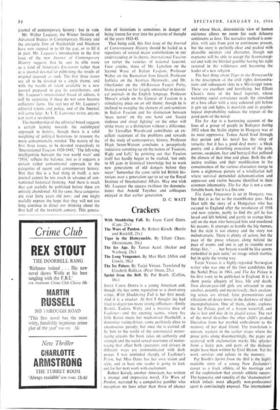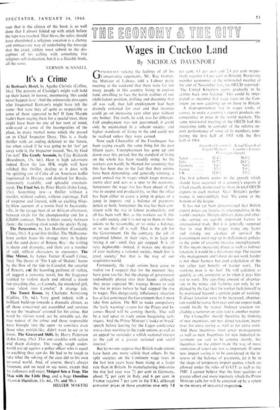Crackers
With Shuddering Fall. By Joyce Carol Oates. (Cape, 21s.)
The Ice Age. By Tamas Aczel. (Seeker and Warburg, 25s.) The Long Vengeance. By Max Hart. (Allen and Unwin, 18s.) The Ice Palace. By Tarjei Vesaas. Translated by Elizabeth Rokkan. (Peter Owen, 25s.) JOYCE CAROL CmaTs is a young American and, though she has some reputation as a short-story writer, With Shuddering Fall is her first novel. And it is a cracker. At first I thought she had tried to digest too many strong influences—Emily Brontë, Eudora Welty and a massive dose of Faulkner—and the opening scenes, where fey little Karen meets her mechanised Heathcliff, a demoniac racing-driver, come perilously close to unconscious parody; but once she is carried off by him to the world of the commercial motor- racing circuits the book takes on authority and strength and the weird sexual overtones of motor- racing that affect both spectators and drivers in different ways are communicated with dark power. I was reminded sharply of Faulkner's Pylon, but Miss Oates has her own vision and style, and at least one reader is going to look out for her next work with excitement.
Robert Kirsch, another American, has written a strange and impressive novel, The Wars of Pardon, narrated by a compulsive gambler who recognises no laws other than those of chance
and whose bleak, deterministic view of human existence allows no room for such delusory sentiments as love. The narrative method is com- plex, with cuts from past to continuous present, but the story is perfectly clear and packed with plausible incident and character, though not everyone will be able to accept the thaumaturgi- cal end with the blinded gambler having his sight restored in the wilderness and becoming the leader of a new religion.
The best thine about Tiger in the Honeysuckle is the description of the civil rights demonstra- tions and subsequent riots in a Mississippi town. These are excellent and horrifying, but Elliott Chaze's story of the local reporter, whose wakening social conscience needs the stimulant of a love affair with a sexy coloured girl before it gets up and fights, is mawkish and its psycho- logical improbability reduces the impact of the good parts of the novel.
The Ice Age is a harrowing account of the lives of a group of people in Budapest during 1952 when the Stalin regime in Hungary was at its most oppressive. Tamas Aczel lived through that period and his novel has the sting of veracity; but it has a good deal more: a bleak poetry and a disturbing evocation of the pain, sorrow, suspicion, fear and betrayal that polluted the climate of that time and place. Both the ob- jective realities and their modification in the consciousness of the various characters merge to form a nightmare picture of a totalitarian hell where survival demanded dehumanisation and oppressor and victim became identified in their common inhumanity. The Ice Age is not a com- fortable book, but it is a fine one.
The Long Vengeance is set in Hungary, too, but that is as far as the resemblance goes. Max Hart tells the story of a Hungarian who has escaped to England after the revolution of 1956 and now returns, partly to find the girl he has loved and left behind, and partly to avenge him- self on the man who betrayed him and murdered his parents. It attempts to handle the big themes, but the style is too clumsy and the story too melodramatic. There is plenty of action, but the pace of the prose wheezes along. behind the pace of events and one is apt to stumble over things like,'. . . her breasts would be like acorns embedded in pale satin,' an image which startles, but in quite the wrong way.
Tarjei Vesaas is a highly-regarded Norwegian writer who was one of the four candidates for the Nobel Prize in 1964, and The Ice Palace is his first work to be published in England. It is a short poetic allegory of love, life and death. Two eleven-year-old girls are attracted to one another, potently and mysteriously; their awaken- ing senses are stirred; faint premonitions and vibrations of desire move in the darkness of their incomprehension. One of them, alone, explores the Ice Palace, part of a frozen waterfall, and she is lost and dies in its glacial caves. The rest of the novel describes the other child's gradual liberation from her morbid enthralment to the memory of her dead friend. The translation is uneven, weakest in the earlier stages where the prose jerks along disconcertingly, the pages are scattered with exclamation marks like splashes from a leaky pen, and parts of the dialogue might have been written by Enid Blyton. Yet the work survives and echoes in the memory.
Pat Booth's Sprint from the Bell is the highly readable story of a young New Zealander's career as a track athlete, of his marriage and of the exploitation that attends athletic success. The hypocrisy and venality of the `shamatetnism' which infects most allegedly non-professional sport is convincingly exposed. The international race that is the climax of the book is so well done that I almost folded up with stitch before the tape was reached. That Steve, the miler, should have abandoned a religious vocation is a clumsy and unnecessary way of underlining the message that the crack athlete must submit to the dis- ciplines of his calling with something like religious self-dedication, but it is a likeable book, all the same.
VERNON SCANNELL



































 Previous page
Previous page